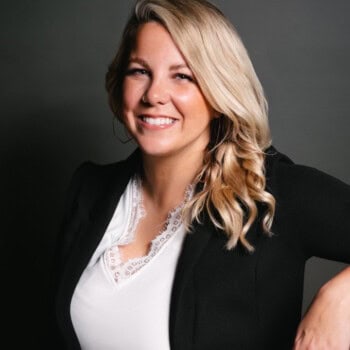It’s the American dream still, right? Get a good job, buy a home, have a family – maybe enjoying each other’s company within a white picket fence with a BBQ on a Sunday afternoon.
I think it still is. Although the landscape has certainly changed over the last few years.
If you’re considering buying a home for the first time, upgrading or downsizing your current home or buying property as an investment – keep reading, this one’s for you.
Here’s what’s in store for you.
- Financial Considerations
- Social Emotional Factors
- Lending Perspective
- Agent Perspectives
My Home Ownership Story
I’ve been a homeowner for 21 years, purchasing my first home at the tender age of 22 with very little knowledge of what I was doing and a first time home buyers program that required no down payment in 2003.
After that first home was sold in 2006, a small condo all of my own was next for a short time.
Right after we were married, mine and James’ first family home together was purchased in 2008, and then we added to our collection a townhouse in 2009 and then the home we live in today in 2013.

We sold our first family home together and the townhouse in 2014/2015 as part of our debt free journey, and there are times we regret saying goodbye to that townhouse as income property, for sure.
We live and we learn, right? I want you to be informed and educated. Let this be just part of your research on your journey to home ownership.
“Don’t throw away your money on rent.”
Said by anyone 20+ years old than you.
I’m sure you’ve heard this saying before, and I’d tend to agree with the idea that putting money toward something that is yours is more beneficial than paying someone else’s mortgage. But the fact of the matter is that there are several financial considerations when thinking about purchasing a home.
Financial Considerations
Monthly Costs
This is often the top question – what will my payment be? And it’s an important one.
First things first, what impacts your payment?
Sale price, interest rate and term are our initial factors – but wait, there’s more. Property taxes, home owners insurance and private mortgage insurance will also impact your monthly payment. Let’s talk it through.
- Sale Price – Certainly this came to your mind. There will be a difference between the 200k home and the 1.2m dollar home.
- Interest Rate – It does seem like much – 3% versus 7% but that shift will make a significant impact on your payment amount, and more importantly long term price you’re paying for your home. Side note – refinancing is a viable option when lower rates are in sight again, but it’s never a sure thing and will cost you to go through the process.
- Term – Your mortgage term, or the length of your loan makes a difference. Stretching your payments over 30 years is going to make a lower payment than a 15 or 20 year term.
- Property Taxes – You can see big shifts in payment amounts based on property taxes and taxes are assessed based on real property value plus any assessments, multiplied by your area’s tax rate – and those widely vary.
- Homeowners Insurance – Protection for your largest asset is not only required but very important and can vary based on different features the home may have.
- Private Mortgage Insurance – PMI is a requirement if you have a conventional loan and put less than 20% as a down payment. This is protection you pay for to benefit the lender in case you default on the loan. Rates range from .25 to 2.25% of the loan amount and can vary based on size of loan and your credit score.
Now that you have all of that information – you can see why the answer is to what is my payment is…complicated and very well answered with, “it depends.”
Zillow, Redfin, Google, Bankrate, and Vertex42 all have great calculators to include these factors when you’re considering purchasing a home.
Let’s talk about a few other important financial factors in the buying process.
- Down Payment – 20% is the magical number that gives you loads of equity and lets you skip out on the dreaded PMI. Is it a must? No. But something to consider in your overall financial sleuthing.
- Closing Costs – Ponying up a down payment isn’t the only pass go requirement, you’ll also need to play for closing costs which range between 2-5% of the purchase price and, market depending – can be negotiated with your sale.
- Credit Score – Your credit score will impact your interest rate, your insurance price and the rate of your PMI. Having a healthier score will serve you if you’re going traditional underwriting or approval of your mortgage. That means that your length of time having credit, on time payments, and credit use compared to limits are important.
- Affordability – How much should your payment be compared to your income? You’ll hear 25% as a rule of thumb, and in some areas of the country that feels about right. There are areas however that it’s less reasonable and should give you pause for either buying in that area, and/or shoring up other financial factors to give you more wiggle room for a higher percentage.
- Debt to Income Ratio – This calculation is trying to predict your risk and what you can afford. Your debt payments divided by your gross annual income should be less than 35% to be considered acceptable. Some lenders will approve near the 45% mark.
- Real talk here for a minute. If you have too many ‘debt bills’ you are more likely to start to STRESS about your highest bill – your mortgage. Take care of your debts to put yourself in a better buying position.
What about after the purchase?
Maintenance Costs – Repair funds are one of the most common ‘missed’ budget category items. Stuff breaks, needs replaced, repaired, you name it – and you are now 100% responsible. Not taking care of these items will cost you dearly in the future, I vote that you’re proactive with your maintenance and planning.
How much should your repair or maintenance fund be?
Pick the number that you like best – there’s a rule of thumb to set us 1% of the value of the home each year for maintenance. I like the idea of $1 per square foot per year as a starting point. Either way, it’s proactively setting aside money and permission to spend on keeping your largest asset in good shape.
Side note, this maintenance fund is not for holiday decor or throw pillows – it’s for the unsexy expenses like mulching the yard, deck stain and air filters.
- Furniture Expenses – You’ll likely be itching for a new sofa, updated blinds, and ______ soon after you move in. Consider these expenses when you’re house hunting in advance and determine how quickly you need to fund these items and their costs.
Social Emotional Factors
Buying a home means so much more than a ‘good investment’. That investment is only “good” if it makes sense financially and emotionally.
There are feel good factors of home ownership to consider.
- What’s the neighborhood like? A place that you see yourself in community for several years?
- What are the schools like? Regardless of if you have littles or not – the rating of the school will lend to other factors like cost of property taxes, and your desire to have your kids in those schools if applicable too. Adding on private school tuition makes a big difference to your budget if you don’t like the school system.
- Is it walkable? Does that matter to you? I LOVE the fact that I can walk to my gym, the library, my kids’ school, the grocery store and a friend’s home all in 10 minutes or less.
- Longevity should be considered. You don’t really want to house hop like I did – it gets expensive when you consider down payments and closing costs. Do you really see yourself in that space for 5+ years?
- Pride of ownership is a factor. Would you be proud of this new purchase? Having your stamp on a little piece of land all your own feels incredible – don’t purchase something that leaves you feeling lackluster.
Enough talk from me, let me share some expert opinions from people I know and trust in the industry.
Guest Panel

Rachel (Ray) Delavan
Delavan Realty, INC
email: [email protected]
phone: M 971-276-0158
https://linktr.ee/racheldelavan
When asked to speak from a current home owner’s perspective, this is what Ray shared.
“When someone owns a home and is thinking about selling, there are several things to take into consideration. As always, buying and selling a home is an emotionally involved process, driven by lifes intersections of change (IE; birth, job changes, anniversaries, retirements, death, etc.). When you are buying up or down in size, it is most important to approach from a holistic financial standpoint. Opportunities to win or lose are higher when a sale and a purchase is involved. Savvy choices and excellent representation can double your wins, while poor planning and representation can double your losses.
Some of the areas to make sure you are dialed in and leveraged, are tax implications of gains (capital gains tax), interest rate risk, down payment equity management, and incorporation with your financial planner. You also want to take into account construction and improvement costs of the home you are selling along with the one you intend on purchasing, as well as property tax and local zoning laws!
It is important that in order to maximize your sale, you get an assessment on work needing to be done to get your home ready for the market. Things that will maximize your ROI and double your dollar should be the focus. Your professional representation should be selling homes full time (ideally 40 plus transactions a year), and they should have financial, tax, construction, and property management representatives on speed dial. You also want to make sure your CPA is in cahoots with your financial planner, real estate agent, and lender. This is imperative to ensure you are saving money where it makes most sense, putting the right amount down on the new purchase, investing, and crafting an offer on the new home purchase that makes sense for YOU. It may or may not make sense in the current market of higher interest rates to put a large amount down vs. investing some of your gain. Each person is going to have a different financial picture that should be tailored to them specifically! There is no one size fits all, so lean heavily on your team to create the best outcome for your situation!”
Myla Sweet
Licensed Real Estate Agent in Oregon w/ Oregon First
Email: [email protected]
When asked to speak from an investment perspective, here’s what Myla shared.

“Can you believe the highest mortgage interest rate was 18.61% in 1981, according to Freddie Mac? In today’s buying climate, it’s easy to forget rates have been higher and homes were still sold. In 1981, I’m sure they would have preferred today’s rate, there’s no doubt about it.
Why buy a home? There are so many benefits such as appreciation which means over time the home purchased can be worth more years later than your price purchased, Yes, that’s right. Your home can increase in value.
Other home purchase benefits
- Tax deductions (reduce your tax cost).
- Home equity (can be used however you like including as a line of credit)
- Consistent payments (outside of taxes and Hoa fees, your payments is predictable)
- Privacy (It’s nice to have your own space.)
- Freedom to renovate and decorate!
- Able to make extra money renting a room and/or build a rental on your property (ADU).
- Rates can go up and buying now helps to control your mortgage payment.
As you can see, I’m an advocate for purchasing a home right now. I genuinely think there are so many benefits. Yes, even with higher rates! It’s important to understand what homes appreciate in your area, the best financing option for your purchase, and rent vs buying if this is your first purchase.”

Carlie Clemens
Stone Bridge Mortgage Group
Phone: 503-347-3160
Email: [email protected]
When asked to share from a lending perspective, here’s what Carlie said.
“If you’re considering buying a home, even if it’s years into the future, getting in touch with a loan officer sooner rather than later is a great idea. They can guide you through various mortgage options and strategies to make sure you’re well-prepared for loan approval when the time comes. Also, as you plan for this goal, remember not to underestimate closing costs. These expenses, including appraisal fees, title insurance, and prepaids like property taxes and insurance, can increase your out-of-pocket costs by an additional 2-5%, not including your down payment. Knowing about these costs upfront helps you budget wisely, laying a more solid financial foundation for your home purchase.”
Should you buy a home in 2024?
It depends! Be wise about making your purchase, consider both the needs of your head and your heart…and the advice of these trusted colleagues.


Sign up below to get a weekly email with tips, tricks and truth about intentionality with your time, talent and money.
